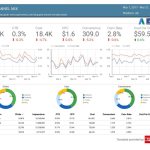Tracking Its Consumers, Google Is On The Move
by Thom Forbes, Featured Columnist @tforbes, October 28, 2016
More so than ever, the elusive consumer is a moving target if (November 08, 2016)’s Alphabet results are any indication. And since the Google parent’s services are just about ubiquitous on all smartphones, whatever the operating system may be, it quite literally is.
![]()
“Search on mobile phones surpassed desktop queries last year and the company said that mobile Web searches were now the driving force behind revenue growth,” reports Daisuke Wakabayashi in the New York Times. And some analysts believe more than half of Alphabet’s revenue comes from mobile ads, according to the Wall Street Journal.
If Google CEO Sundar Pichai is correct, a consumer on the go is a consumer who is primed to purchase.
“Our proposition to marketers on mobile is simple and is resonating. Our mobile properties like Search, YouTube, Maps, and Google Play are where people turn when they are actively interested in something,” he told analysts on an earnings call transcribed by Seeking Alpha. “They are using our services because they want to actively watch something they are passionate about or because they want to know, go, do, or buy something. They are super-attentive and engaged. It’s just like people used to be glued to their TV screen during prime time.”
Except that all the stores were closed when Ed Sullivan was trying to get you to run out and grab a box of Fab detergent off the shelf and two-day “free” delivery would have been a moonshot if anybody had been thinking about it.
Google’s Android mobile operating system is pre-installed in about 87% of the world’s smartphones according to IDC, reports Jack Nicas in the Wall Street Journal. And Google “controls 95% of the mobile-search market, compared with 78% on personal computers, according to digital-marketing firm Merkle Inc., because it is the default search engine on both Apple’s iPhones and Android devices.”
Nicas further reports “mobile users click on search ads at a higher rate than desktop users,” according to Merkle, “in part because mobile ads take up virtually the entire screen for some searches.”
Overall, “Alphabet (GOOGL) reported a solid top- and bottom-line beat with its third-quarter results after the bell Thursday, topping the high expectations that had driven the stock to new all-time highs in recent weeks,” write Jim Cramer and Jack Mohr for The Street. “Revenues of $22.45 billion (up 20% year over year and 23% in constant currency) came in roughly $400 million ahead of consensus and EPS of $9.06 smashed consensus of $8.64.”
But some Alphabet businesses are finding the path to profitability to be a longer and more winding road than mobile advertising.
“The executive who ran the Google Fiber unit stepped down this week as the company halted roll-out of the super-speedy Internet and announced it’s laying off 9% of its staff,” writes Jessica Guynn for USA Today. “[CFO Ruth] Porat told analysts Alphabet remains committed to Google Fiber which is being deployed in 12 cities but is pausing roll-out in eight others as it develops new technologies such as wireless.”
Guynn reports that “Alphabet’s ‘other bets,’ which include smart-home device maker Nest, self-driving cars and the X research facility, generated revenue of $197 million, but reported an operating loss of $865 million.”
On the conference call, Porat “noted that there will inevitably be ‘course corrections’ with the less mature moonshot efforts,” reports Seth Fiegerman for CNNMoney.
“Porat added that there has been ‘increased adoption’ for Nest and said that the self-driving car division is making progress with testing on roads in four cities. For Fiber in particular, Porat said the team is pausing to ‘focus on the potential’ of new efforts like wireless technology ‘before we re-accelerate deployment,’” Fiegerman writes,
CNBC’s Anita Balakrishnan reminds us that Google co-founders Sergey Brin and Larry Page changed its corporate structure last year by creating a collection of companies called Alphabet and naming Pichai to run Google.
“The move was praised for adding transparency between core businesses — such as search, Android and YouTube — and its more creative endeavors, ‘smaller bets in areas that might seem very speculative or even strange when compared to [Google’s] current businesses,’” she writes.
I would not bet against them. I recall putting together a program for a two-day conference on the state of Web advertising in 1999. None of the presenters used the word “Google” in the title of their talk. It was “just” a search engine back then.
MediaPost.com: Search Marketing Daily
(3)











